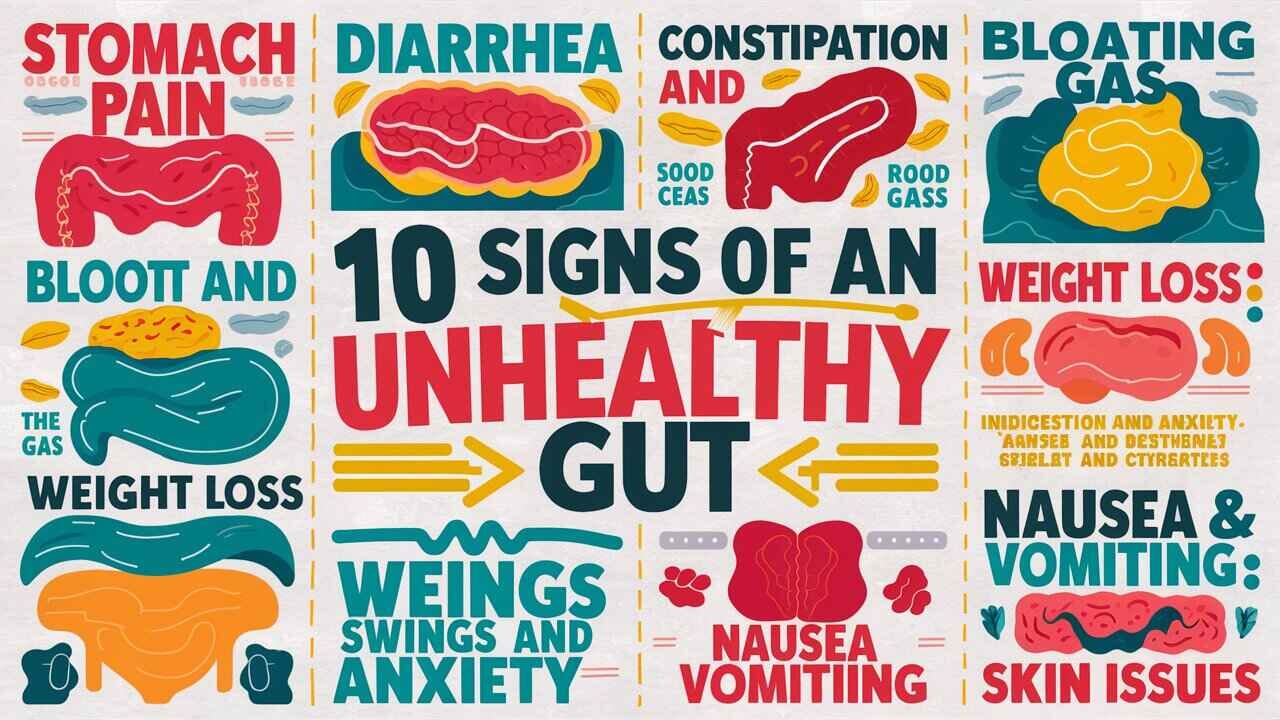Our gut is also known as the digestive system and it is a crucial part of our overall body health. If you have digestive issues, don’t worry about it. You are not alone. Research from 2019 shows that every year 2.9 billion prevalent cases of digestive diseases worldwide, which the 38.4% of all prevalent diseases. It is your responsibility to break down food, eat nutrients, and manage waste. When our gut isn’t functioning properly. It could affect many components of our day-to-day existence. So we first to know the signs of an unhealthy gut. Here we are discussing the major 10 signs of an unhealthy gut.
10 Signs of an Unhealthy Gut
| # | Sign | Short Note |
|---|---|---|
| 1 | Stomach Pain | Frequent discomfort. |
| 2 | Diarrhea | Loose stools. |
| 3 | Constipation | Difficulty passing stool. |
| 4 | Bloating and Gas | Excess gas buildup. |
| 5 | Blood in the Stool | Visible blood. |
| 6 | Weight Loss | Unexpected changes. |
| 7 | Mood Swings | Linked to gut health. |
| 8 | Indigestion | Frequent discomfort. |
| 9 | Nausea | Recurring episodes. |
| 10 | Skin Issues | Acne or eczema. |

Table of Contents
What is an Unhealthy gut?
An unhealthy gut is a state in which there is an imbalance of the organisms. The gastrointestinal tract results in digestive problems, poor and or compromised immunity, and inflammation throughout the body. Some of the symptoms may include; bloating, gas, constipation, Diarrhea, fatigue, and food sensitivities. Dysbiosis, a condition characterized by the severity difference, is caused by poor diet choices, antibiotic overuse, stress, or sleeping with no or little rest. The negatively charged gut can also hinder nutrient intake hence affecting the body’s well-being. By identifying such signs early and a good check on the way of life, the balance of the gut is regained, and no severe complications surface.
10 signs of an unhealthy gut
Stomach pain
It is one of the commonest gut symptoms and it can have many causes. More often than not, stomach pain that persists is caused by irritable bowel syndrome (IBS). It's a disorder of the gut-brain axis in which people are highly sensitive to the normal stretching of the bowel wall. Diagnosis of IBS requires ruling out other common causes of stomach pain such as inflammatory bowel disease, coeliac disease, and bowel cancer.
Diarrhea
Diarrhea is when you open your bowel more often or when your stools are looser than normal for you. That’s such a crucial part of it, because it ‘normal’ for you to open your bowels maybe 3 times, that’s normal, you might do it 3 times a week, or whatever the case, everybody’s stool consistency is different. Diarrhea is so personal to each individual that one person is obsessed about his or her diarrhea and another doesn’t care a lot. Infection with a bacteria, virus, or parasite may cause diarrhea. If that’s continuing though, you have to start to think about things like inflammation, IBS, coeliac disease, and bowel cancer.
Constipation
As with diarrhea, constipation is a situation in which you're not opening your bowels as often as usual for you, or where your stools are harder than usual. Functional constipation means that constipation that didn’t start because of something specific, can just sort of become the “norm” for some people. Another common cause of constipation is IBS. Sometimes bowel cancer can also slow transit by causing a partial blockage of the bowel, but only more rarely this can lead to constipation.
Bloating and gas
It’s the gut feeling when you feel like your stomach has been blown up or you’re feeling rumbling not so pleasantly and feeling like you might be belching or passing wind more often of late. With some, there is measurable abdominal distension where the stomach swells up like a balloon. Common causes of bloating include IBS, a stomach bug called H. pylori, and coeliac disease.
Blood in the stool
It can be alarming, but as it turns out, it is common for you to see blood in your stool. It will affect most people who will have it at some point. This is usually due to hemorrhoids (piles) or a tear in the bottom (a fissure). When the blood from these anal areas is coming in frequently the blood will be fresh and bright red. Bleeding that occurs higher up the bowel, from a tumor or inflammatory bowel disease, for example, is often darker red and mixed with the stool. You don't have to see blood in the stool for there to be blood in the stool. This is what we look for when we do a qFIT test to screen for bowel cancer.
Weight loss
Weight loss can be a very “general” symptom with a gut-related and a gut-related cause. Often, bowel symptoms and unintentional weight loss signify a major gut disorder, like coeliac disease, inflammatory bowel disease, or bowel cancer, which is a 'red flag'. On the other hand, if you have irritable bowel syndrome, you can have the same gut symptoms but lose no weight.
Mood Swings and Anxiety
Millions of nerve cells in the gut make it the "second brain" and gut neurotransmitters such as serotonin, the 'feelgood' hormone, are known to control mood and emotions. Serotonin production in the gut can be thrown off by an imbalanced gut microbiome which may also contribute to mood disorders. In particular, gut inflammation can result in the stimulation of pro-inflammatory cytokines linked with the development of anxiety and depression. Not only does an unhealthy gut impact the absorption of needed nutrients such as vitamin D, omega-3 fatty acids, and magnesium, all important for mental well-being, but it can also hurt mood.
Indigestion
People use indigestion as a vague term to describe upper stomach pain, heartburn, and reflux. Indigestion is also known as dyspepsia. Most cases of indigestion are caused by ‘functional dyspepsia' when people have the symptoms (dyspepsia) but no cause can be identified. This was a gut-brain disorder like IBS. The other causes include a hiatal hernia, H. pylori, coeliac disease ulcer, and small intestinal bacterial overgrowth.
Nausea and vomiting
If nausea and vomiting become sudden then a short-term infection with a virus, bacteria, or parasites will usually be the cause. It settles pretty quickly. Certainly, H. Pylori and coeliac disease should be considered if the symptom is more long-term. Acute severe vomiting can also be a sign of blockage in the bowel more rarely. For instance, bowel cancer or scar tissue left after an operation on the gut can sometimes do this.
Skin issues
However, some people can answer with gut health-warming eczema, rash, or acne. An unhealthy gut can lead to inflammation and immune reactions appearing on your skin. By improving gut health, these skin issues could be helped.

